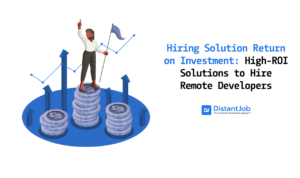DevOps engineers bridge the gap between software development and IT operations, streamlining software delivery. Their main role involves automating and optimizing the software development lifecycle, from coding and deployment to maintenance and updates. Because of this, organizations that implement DevOps practices have experienced a 60% lower failure rate of new releases, among other benefits (Gartner).
However, being a highly specialized role, hiring a DevOps engineer involves another level of complexity compared to other technical roles.
According to research by CodinGame, DevOps engineers are among the top three positions that recruiters struggle the most to fill. Why? DevOps engineers require technical expertise in multiple disciplines, as they need to be skilled in software engineering, site reliability, and operations. Finding candidates with the right blend of skills and experience is difficult.
So, how can you develop an effective process for hiring DevOps engineers, saving time and resources? In this guide, we’ll explore the best practices, essential skills to look for, and our expert tips to help you craft a successful recruitment strategy.
What to Look For When Hiring a DevOps Developer
Hiring the right DevOps engineer requires careful evaluation of both their technical capabilities and expertise and soft skills, which reflect their role in fostering collaboration among developers, IT staff, and system operators.
Here are some of the general aspects to consider in your DevOps hiring process:
1. Look for Core Competencies
A DevOps engineering role goes beyond knowing the technical aspects or mere proficiency in tools like Kubernetes or Terraform. It involves building tools and creating services in the DevOps realm. Look out for candidates who can effectively integrate different technologies and propose solutions.
DevOps engineers should always be the subject matter experts, tailoring solutions that address and anticipate projects’ technical and security needs. They should understand in-depth programming environments and operational protocols.
These are the core competencies that all DevOps engineers are expected to know and integrate:
- Coding and Scripting: Proficiency in languages like Python, Ruby, and Java and the use of scripting to automate routine tasks.
- Networking Knowledge: Understanding of network protocols (TCP/IP, HTTP, SSL/TLS), and VPNs, especially as they relate to operations and security.
- Infrastructure as Code (IaC): Expertise in tools like Terraform, Ansible, and Kubernetes to manage infrastructure through code.
- Continuous Integration/Continuous Deployment (CI/CD): Skills in setting up and maintaining pipelines using Jenkins, GitLab CI, or similar tools.
- Version Control Systems: Proficiency with tools like Git to manage code changes.
- Containerization and Orchestration: Knowledge of Docker and Kubernetes to manage containerized applications.
- Monitoring and Logging: Experience with tools like Prometheus, Grafana, ELK Stack (Elasticsearch, Logstash, Kibana) for system monitoring and logging.
- Cloud Services: Familiarity with cloud service providers such as AWS, Azure, and GCP, and their respective services and management tools.
- Security Practices: Understanding of security best practices and tools to secure applications and infrastructure.
💡 Related: DevOps and SysAdmin: Key Differences
2. Look for Problem-Solving and Adaptability
DevOps engineers need to be experts at handling new and unfamiliar challenges. Part of their role is to think critically and apply their skills to practical steps that help them manage legacy stems and drive innovation in dynamic tech systems.
To assess these problem-solving and adaptability competencies, we always recommend situational and behavioral questions that dig deeper into their experiences with complex or poorly documented systems or how they adapted to unexpected situations without extensive external guidance.
These are some sample questions that can help you understand how candidates manage real-world DevOps challenges, blending their technical skills, decision-making capabilities and ability to innovate under pressure:
- Describe a time when you had to deploy an application using a tool or technology that was new to the team. What resources did you use to upskill quickly and ensure a successful deployment?
- Can you walk us through a detailed example of how you managed a critical system outage? What diagnostic tools did you use, and how did you prioritize your actions?
- Have you ever had to significantly modify a CI/CD pipeline to accommodate a new technology stack? How did you approach the integration, and what were the major challenges?
- Tell me about a situation in which you improved a system’s security measures. What vulnerabilities did you identify, and what measures did you implement to secure the system?
- Discuss an instance where you had to automate a complex manual process. What scripting languages did you use, and how did the automation impact the operational efficiency
3. Look for Initiative and Ownership
Because of the proactive nature of a DevOps role, two of the most important qualities every DevOps engineer should have are initiative and ownership. They should be able to identify areas for improvement and take the lead on implementing changes without waiting for directives.
How does this look in a real-case scenario? For example, an engineer might notice inefficiencies in a deployment pipeline and independently start developing a solution, like a new automation script to streamline the process. This behavior not only enhances operational efficiency but also reduces downtime and improves the reliability of software releases.
In this context, hiring DevOps engineers also means evaluating how they take full responsibility for the success or failure of the systems they have managed.
Here are 4 ways you can evaluate initiative and ownership in DevOps candidates:
- Behavioral Questions – Ask candidates about their previous experiences where they have initiated a project or made decisions that led to improvements. Here are some examples:
- Can you describe a time when you noticed a problem in your previous organization’s operations and took the initiative to resolve it without being asked?
- Tell me about a project you started on your own initiative. What motivated you to start it, and what was the outcome?
- Give an example of how you took ownership of an underperforming process or tool and turned the situation around.
- Scenario-Based Questions – Present hypothetical situations (Or you can also present current situations in your company) related to system failures or inefficiencies and ask them how they would manage these. Here are some examples:
- Imagine you’ve deployed a new application that causes unexpected server crashes. How would you handle the situation?
- You’ve identified a significant security flaw in your current project. What steps would you take to address it, and how would you prevent similar issues in the future?
- You are given a project with outdated documentation, and you need to update a critical system. How would you proceed?
- Reference Checks—Speaking with former supervisors or colleagues can help you understand a candidate’s impact on a team more in-depth, exploring behaviors related to initiative and ownership.
- Portfolio Review – Evaluate their projects and contributions to see evidence of self-directed projects and leadership in driving changes or resolving issues.
4. Look for Good Communication and Collaboration Skills
A core aspect of DevOps engineers is bringing together different teams, such as development, operations, and quality assurance, to understand their needs and provide solutions. Specificity in their communications ensures that complex and quality details are understood by all stakeholders, enhancing teamwork and communication.
DevOps practices such as continuous integration and deployment require seamless collaboration to quickly identify and resolve issues, integrate feedback and adapt processes.
You can do this by asking them to describe specific instances where they collaborated on team projects or led cross-functional initiatives. Also, through reference checks, you can gain more insights about their teamwork and project management skills.
5. Look for Hybrid Skills and Interdisciplinary Expertise
Most DevOps skills assessments don’t take hybrid skills into account. Both these and interdisciplinary expertise are what enable DevOps engineers to manage the broad scope of all of their responsibilities.
DevOps responsibilities involve knowledge and expertise in different fields. For example, a DevOps engineer might need to script and automate features, handle system operations, and ensure compliance with security protocols. This requires a blend of programming, system administration and security skills.
The versatility that the DevOps role demands, enhances a team’s capability to innovate and adapt rapidly to changing technologies and project demands. But how can you evaluate hybrid skills or interdisciplinary expertise?
A simple real-based scenario assessment can be using your own company as a reference. Here’s an example:
“We have this problem and need someone to investigate potential tools and solutions. Could you identify the most suitable methods for addressing this issue, explain your choices, and then outline your implementation plan?“
Typically, this task could be a take-home assignment. We would then ask the candidates to present their proposed solution during the final interview.
6. Look for a Rarity of Multifaceted Experts
If you’re targeting DevOps engineers, prioritize candidates who not only possess deep technical skills but also a comprehensive understanding of DevOps principles and their applications.
The thing about multifaceted experts is that, in most cases, they are not actively looking for a job. These professionals are often in high demand and don’t need to search for opportunities as they are reached out to by recruiters and companies.
Given this competitive landscape, recruiters must adopt a proactive and engaging approach. At DistantJob, for example, we focus on cultivating relationships with potential candidates well before an urgent hiring need emerges, allowing us to develop a ready pipeline of top talent for emerging opportunities.
Where to Find Qualified DevOps Engineers
Now that you have a well-defined idea of what to look for in a DevOps engineer, the next question is, “Where?“
Experienced recruiters already have their database and key places where they know they can find specific technical roles, but for those who have no idea where to start, here are the main places
Recruitment Agencies
The biggest problem with HR and many recruitment teams right now is that, in some cases, they don’t have the required knowledge to evaluate technical candidates. Particularly for complex roles like DevOps, you need the resources and expertise to conduct thorough evaluations to ensure you’re hiring the right candidate.
If this is your case, then reaching out to tech recruitment agencies can help you save time, money and valuable resources. For example, at staffing agencies like DistantJob, we focus on exploring remote talent that suits all your requirements. From technical skills to evaluating behavioral aspects, our holistic approach ensures that the candidates we send your way are ideal for the role.
Tech Job Boards
Another common way to attract skilled tech professionals is through tech job boards such as Stack Overflow Jobs, Dice, or TechCareers.
However, make sure you make a clear IT job description that clearly displays the role, responsibilities and requirements. Here are a few tips for this:
- Specify the Role: Clearly define the job title and outline whether it’s a junior, mid-level, or senior position.
- Detail Responsibilities: List specific duties, such as maintaining CI/CD pipelines, automating infrastructure, monitoring system performance, and ensuring cybersecurity compliance.
- List Requirements: Include necessary technical skills like proficiency in tools like Jenkins, Docker, Kubernetes, and cloud platforms. Mention required experience levels and any certifications.
- Highlight Soft Skills: Emphasize the importance of collaboration, problem-solving abilities, and effective communication.
- Define Expectations: Explain the expected outcomes of the role, such as improving deployment frequency or reducing system downtime.
Social media platforms, specifically LinkedIn, have proven to be effective ways to attract and engage with candidates. The main reason is that they provide a wide network of professionals from different industries and backgrounds.
You can leverage targeted searches through specific keywords and filters to find candidates with the exact skills and experience required for DevOps roles. Often, these candidates might already have jobs, but it’s a good way to start building a talent pool for future opportunities.
Additionally, LinkedIn also has a recruiter’s tool that offers advanced search capabilities, tracking and management features useful to streamline the hiring process.
Referral Programs
Over 84% of companies use employee referral programs to help them speed up the hiring process. The results?
- 40% more likely to be retained after one year than non-referral hires
- Referred employees are 18% more likely to be satisfied with their jobs
- The cost per hire for employee referrals is typically lower than other recruiting methods.
While this method may not always be the most effective, particularly if you have a startup or a small company, encouraging current employees to refer qualified DevOps candidates in exchange for a reward or compensation package can still be beneficial.
Best Practices for Interviewing DevOps Candidates
If you have DevOps interviews coming in the way, here is some of our best advice for you to identify top candidates:
Figure Out Your Best Evaluation Method
When looking to hire for a DevOps role you’ll quickly realize that a simple questionnaire is not enough. The best way to fully understand a candidate’s knowledge and expertise is through a set of interviews that will vary depending on the role itself.
Figure out the exact skills and experience you’re after, and based on that, it’s easier to see what types of tests you need. Given the complexity of the role, many companies like giving take-at-home assignments.
However, keep in mind that if these assignments take too much time for them to complete, candidates would rather ditch the recruitment process rather than do “free work“ so it’s good to give a monetary incentive in these cases.
In the first interview, try to make it mostly about them. A good ice breaker in these cases is to ask them about their previous work so they can highlight their strengths and abilities based on their professional experience. Here you can get a deeper understanding of their experiences with DevOps environments, tooling and processes.
Identify Your Negotiables vs Non-Negotiables
It’s almost impossible to find a candidate who meets all your requirements. Those who do often demand a salary beyond your budget. Instead of prolonging the recruitment process, it’s more practical to determine which skills are essential and which are negotiable.
Particularly in roles like DevOps, that are interdisciplinary, candidates may have expertise in some areas but lack experience in other areas. But, good candidates are those who have proven their ability to learn and adapt to new environments quickly. This is the type of candidate you should be after, someone who can easily learn and be open to new tools and processes.
Non-negotiables would be those skills that are a must-have based on the needs of your project. Once you’ve identified these, it will be easier to craft a customized interview.
Use Mixed Interview Techniques
Don’t focus only on the technical aspects. Yes, DevOps engineers should be experts in certain skills and areas, but hard skills are just a part of the equation. For roles that are as interdisciplinary as DevOps soft skills like collaboration, communication, autonomy, and leadership are key.
Combine technical assessments, with behavioral questions, reference checks and portfolio reviews (if it makes sense) to have a more holistic approach to the candidate’s abilities.
We always recommend simulating real-world scenarios by presenting candidates with past failures or projects in your team. This approach allows them to assess the issues and propose solutions, showcasing their technical expertise along with their communication and collaboration skills.
Additionally, group interviews are ideal so you can see first-hand how candidates interact with team members.
Provide Feedback
Hiring for a DevOps role requires more than one or two interviews, because of the complexity of the role. In many cases, candidates spend time and effort through these interview rounds, so for those who don’t make the cut, make sure always to let them know about this.
Many companies don’t even send an email to let them know they have not been selected. This leads to frustrations, and ultimately a bad reputation for your company.
Out of respect for their time, the least you can do is to send them an email explaining the situation, giving them feedback that can help them for the future.
It won’t even take you 10 minutes of your time, and they will highly appreciate the gesture.
Speed Your Recruitment Process with DistantJob
The most challenging aspect of hiring DevOps engineers is the complexity of the role itself. You need someone who will take charge and make important decisions, so having a well-established recruitment process will allow you to evaluate candidates in an efficient way.
If you want to skip this phase and hire a DevOps engineer without having to take weeks or months to find them, let’s work together. At DistantJob, we have a 3-tier approval process where we meticulously vet candidates from learning your needs through strategic talent sourcing to thorough candidate review.
You can have a skilled remote DevOps engineer working with you in less than two weeks. Want to know more? Let’s start a conversation.




